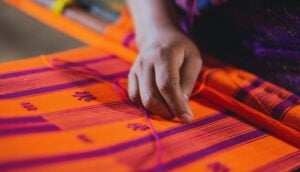During my journey of working with smallholder farmers I have observed that farmers in South Asia face many challenges related to climate change, increased cost of production, lack of awareness of sustainable agriculture practices, and marketing of crops.
The COVID-19 pandemic has added new challenges to farmers’ lives. As an organisation, we have kept in constant contact with farmers since the start of the pandemic. In the early phase, some farmers experienced challenges in selling crops like gram and groundnuts because the markets were closed. This affected their income for some time, but fortunately things have improved from mid-April.
As the pandemic has affected the lives of farming communities, they need holistic support involving long term sustainable solutions based on sustainable agriculture, microfinance, livelihoods, health and decent work. This helps in creating a better quality of life as the new normal.
To understand what actions can be taken to build resilience to withstand future shocks, we conducted a survey among the local partners implementing our cotton training programmes in India and Pakistan, and the farmers taking part in these programmes. Half of the farmers surveyed derive 50-100% of their income from cotton farming.
74% of farmers said their farming has been affected by COVID-19, and they have had agricultural and financial difficulties. Local partners also report farmers being impacted by food scarcity and unavailable medical treatment. Other farmers have not been severely affected but predict impacts on cotton farming and sales next season.
Recommendations for financial resilience
Half of local partners, and 67% of farmers, said access to finance is important to help farmers manage changes in market demand and climate. In the current situation, many farmers have used their savings to continue their farming activities. 62% of farmers said they were not able to build enough savings to buy inputs for the sowing season.
Farmers need more information about government schemes and support in applying for them. 44% of farmers said they did not know about or needed more information about government schemes. Only 39% benefitted from government schemes due to lack of information or not knowing how to access the scheme, not being able to manage the formalities involved or not feeling confident to approach officials.
Self Help Groups (SHGs) and farmer groups provide financial resilience, teaching farming communities how to manage finances, and could also provide low-interest loans.
Income diversification such as raising livestock, or learning other skills to set up small businesses helps build financial resilience. CottonConnect has seen evidence of this working through its vocational skills programme.
Recommendations for agricultural resilience
During the pandemic, physical restrictions meant that farmers had difficulty in getting agricultural inputs when the market was closed. 58% of farmers said they were affected by labour migration, with 55% of local farmers predict that harvesting costs will go up next season because of reduced migrant labour. Farmers value training on sustainable agricultural practices, with 27% recommending stronger and timely training to help build long term resilience.
Local partners stated alternative livelihood training as a key intervention to recover from the immediate impact of COVID-19. During 10 years of delivering farmer training on cotton programmes, CottonConnect has seen the benefit of a holistic approach beyond cotton growing to include alternative income and community wellbeing training. It is important to view farmers not solely as cotton farmers but as farmers. Our survey confirmed that farmers had received additional sources of income as a result of the programme, such as from intercropping, dairy, bio-input and poultry and livestock. Supporting farmers to grow different crops in the field or kitchen gardens means they are not solely reliant on cotton. Accessible loans can support investment, for example in drip pool irrigation.
Recommendations for market linkages
Smallholder farmers in rural locations need connections to be able to buy farm inputs and sell their cotton. Likewise, throughout the supply chain, connections from farmers to ginners to spinners to textile manufacturers need to be strengthened to support cotton sales.
Market linkages can be strengthened by increasing farmer-friendly credit systems and marketing support. Receiving timely information on how the market is performing will support farmers in getting the right price at the right time for their cotton. Governments also can ensure that they pick up their cotton orders as agreed.
Building resilience for cotton farmers includes brands and supply chain actors working together to make sure that farmers have security that they can sell their cotton. This calls for reinventing the role of brands, not just as procurers of cotton, but with a responsibility for each stage of the supply chain, ultimately supporting smallholder farmers to thrive.
Source: CottonConnect survey June 2020 of 57 cotton farmers and 22 representatives from local implementing partners in cotton programmes in India and Pakistan.










